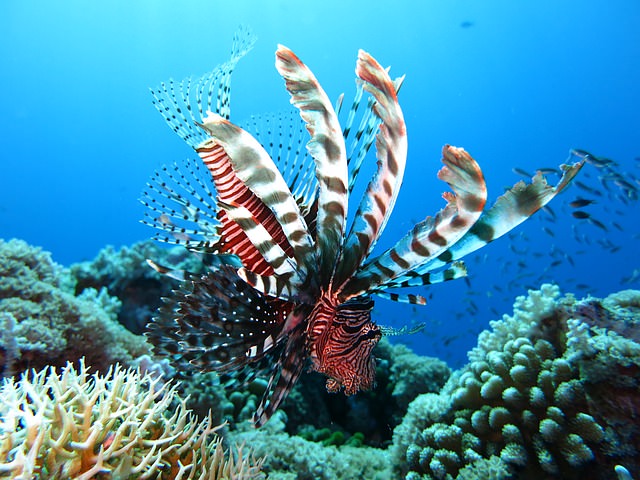A Lion in the Garden – Ferocious Lionfish in the Atlantic Ocean Threatens Natives
From Caracas to North Carolina, the coral reefs of the western Atlantic Ocean are being overrun by a beautiful but invasive exotic. Native to the coral reefs in the tropical waters of the South Pacific and Indian, the lionfish (Pterois volitans) has established itself widely in the Bahamas, Turks & Caicos and Bermuda. Numerous other colonies are expected to grow exponentially in the next year or two unless brought under control.
With lions like these, there won’t be bears or tigers for long
 The lionfish, which has no natural predator in this Caribbean basin, threatens to wipe out indigenous species. Extinction is possible in this scenario, said Lad Akins of REEF. The impact on the eco-system could be grave indeed.
The lionfish, which has no natural predator in this Caribbean basin, threatens to wipe out indigenous species. Extinction is possible in this scenario, said Lad Akins of REEF. The impact on the eco-system could be grave indeed.
In certain areas, where the lionfish population has exploded, research scientists who were studying other species started turning their attention to them.
“In 2005, the first lionfish showed up, and we didn’t pay much attention to it”
Oregon State University zoology professor Mark Hixon, who studies fish in the Bahamas said “The next year, we saw a few more. Then in 2007 there was a population explosion. There were so many lionfish around that they were eating the fish we were studying, and we had to start studying the lionfish. There was nothing else to do.”
A Bit About This Wonderful Fish
Lionfish are beautiful. They are a popular aquarium fish with their colorful red and white stripes, butterfly like pectoral display and striking spines along their back and dorsal area.
They are also top predators and will eat almost anything. They are a threat to most of the local, commercial species – including snapper, grouper and sea bass. Many of the juveniles of these species use the coral reef as their nursery.
The lionfish is also venomous – those spiky spines carry a powerful punch of a neurotoxin that is not deadly, but causes extreme pain to divers or anyone punctured.
It can also cause dizziness, nausea, radiating numbness and systemic problems in other organs.
The good news is that they are not poisonous, and can be eaten. In fact, says Lad Akins of REEF. “They are delicious. They taste like hogfish.”
REEF stands for Reef Environmental Education Foundation, a non profit based in Key Largo, Florida Keys.
The bad news is that before a commercial demand is developed for the lionfish, it could have a serious impact on commercial fishing and recreational deep sea fishing.
Lionfish can’t be caught by hook – at least not easily. They are stalkers, or ambush predators, and to get one on a line you would have to drop your bait right in front of the fish. They are easily caught, however, with a net and tickle stick, similar to how lobsters are caught recreationally.
How Did They Get Here and What Do We Do About Them
It’s most likely that they arrived by airplane. Scientists have ruled out other ways they might have migrated, but they don’t know whether it was owners who dumped the unwanted fish into the bay around Miami or whether Hurricane Andrew destroyed a tank full of them in 1992.
Once they were in Florida waters, the Gulfstream and its corresponding currents have carried their larvae far and wide.
Large populations are now established in the Bahamas, Bermuda where they do occasionally catch them when doing deep drop fishing, and the Turks & Caicos.
Lionfish were first sighted in the Florida Keys and are establishes from Carysfort to the Dry Tortugas.
Approximately 80 of them have been counted and 40 removed.
REEF needs help to get the rest of the population under control.
Because lionfish stay in the same area, if a diver sees one, and reports it to REEF, their professional divers can return to the area and collect it.
I’ve been seeing some Lionfish here in the Cayman Islands.
Can’t wait to see how they taste!
Leave your response!
You must be logged in to post a comment.